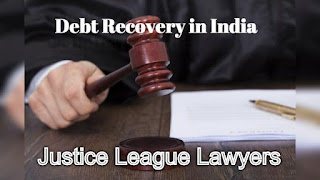When faced with the unfortunate reality of unpaid debts, businesses in Chennai have two primary options to pursue recovery: Arbitration and the Debt Recovery Tribunal (DRT). Each path offers distinct advantages and disadvantages, and the optimal choice hinges on the specifics of your situation. Justice League Lawyers, a leading debt recovery law firm in Chennai, provides unparalleled expertise in both avenues, empowering you to navigate this complex legal landscape with confidence.
Arbitration vs. Debt Recovery Tribunal: Choosing the Right Path for Debt Recovery: Justice League Lawyers - Your DRT and DRAT Experts in Chennai
Understanding Arbitration:
Arbitration is a dispute resolution process where an independent, neutral third party (the arbitrator) hears arguments from both sides and renders a binding decision. This method offers several benefits:
- Confidentiality: Arbitration proceedings are typically confidential, protecting sensitive financial information and brand reputation.
- Flexibility: Compared to the court system, arbitration allows for greater flexibility in scheduling hearings and customizing procedures.
- Speed: Arbitration is often faster than litigation through the courts, leading to quicker debt recovery.
However, there are also drawbacks to consider:
- Limited Scope of Appeal: Arbitration awards are generally less subject to appeal than court judgments.
- Cost: Arbitration can be expensive, with the parties typically splitting the arbitrator's fees.
The DRT Advantage:
The Debt Recovery Tribunal (DRT) is a specialized court established in India specifically to handle cases concerning the recovery of money owed to financial institutions like banks. Here's what makes the DRT a compelling choice:
- Expedited Process: DRTs are designed for fast-track resolution of debt recovery cases, leading to potentially swifter outcomes.
- Lower Costs: DRT proceedings are generally less expensive than arbitration or litigation through regular courts.
- Enforcement Power: DRTs possess strong enforcement powers, allowing them to seize assets or order the sale of property to recover outstanding debts.
However, the DRT system also has limitations:
- Limited Jurisdiction: DRTs only handle cases involving financial institutions, excluding disputes between private parties.
- Less Flexibility: DRT procedures are more rigid and offer less flexibility than arbitration.
- Limited Scope for Complexities: DRTs are well-suited for straightforward debt recovery cases but might not be ideal for disputes with intricate legal complexities.
Justice League Lawyers: Guiding You Through the Maze
Justice League Lawyers, a debt recovery law firm in Chennai, boasts a team of seasoned professionals well-versed in both arbitration and DRT proceedings. They understand the nuances of each option and can meticulously assess your situation to recommend the most effective path forward.
Factors to Consider When Choosing
Here are some key factors to consider when deciding between Arbitration and the DRT:
- Nature of the Dispute: If your case involves complexities beyond straightforward debt recovery, arbitration might provide more flexibility.
- Desired Speed of Resolution: For urgent debt recovery, the DRT's fast-track system could be advantageous.
- Cost Considerations: Weigh the potential costs of both options, including legal fees and arbitrator fees if applicable.
- Confidentiality Concerns: If maintaining confidentiality is paramount, arbitration might be the preferred route.
FAQs
1. When should I consider Arbitration for debt recovery?
Arbitration is a good option if confidentiality is crucial, you value flexibility in scheduling and procedures, and a faster resolution is desired for a relatively straightforward debt recovery case.
2. What are the advantages of the DRT for debt recovery?
The DRT offers a quicker and potentially cheaper process with strong enforcement powers, making it a good choice for recovering debts owed to financial institutions in uncomplicated cases.
3. Can I choose Arbitration even if the other party prefers the DRT?
The option to go through Arbitration depends on the existence of a valid arbitration agreement between both parties.
4. What are the limitations of the DRT?
The DRT has limited jurisdiction and less flexibility compared to Arbitration and might not be suitable for intricate legal disputes.
5. How can Justice League Lawyers assist me in Chennai?
Justice League Lawyers can assess your case, explain the pros and cons of Arbitration and DRT, and represent you effectively in whichever path best suits your needs.
Conclusion
Navigating debt recovery can be stressful, but with the right legal guidance, you can increase your chances of a successful outcome. Justice League Lawyers, with their in-depth knowledge of Arbitration and DRT proceedings, stands ready to be your trusted partner in Chennai. By carefully evaluating your situation and considering the factors outlined above, you can make an informed decision and achieve a successful debt recovery resolution.
Read More

